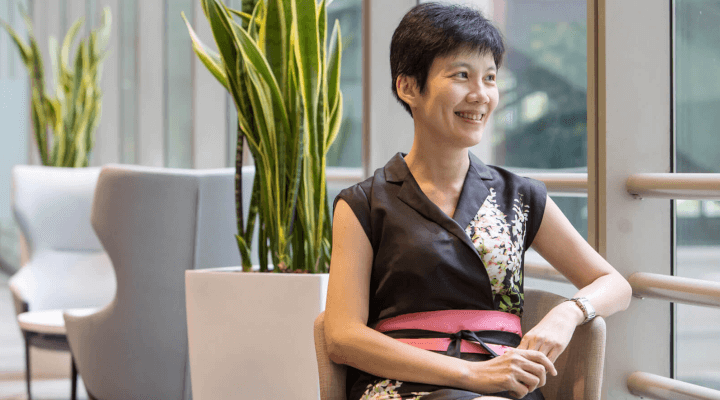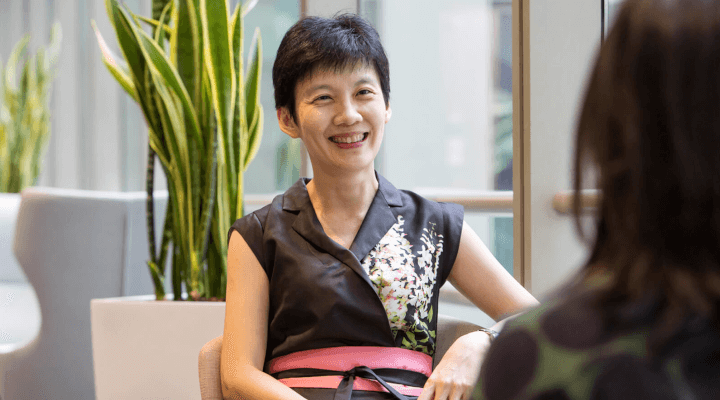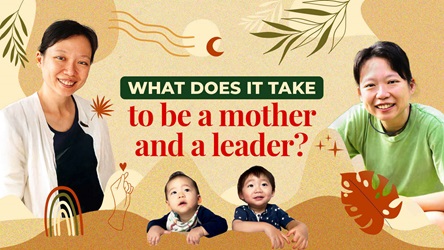“I Never Thought I Would Be A Perm Sec”

A self-described “terrible child” in the Public Service, an “adjunct brain” for then-Deputy Prime Minister (DPM) Teo Chee Hean, and now, a “secret weapon”.
These are among the many nicknames of Ms Lim Wan Yong, 2nd Permanent Secretary at the MOE and MSF, from her 23-year career in the Public Service.
In September 2022, Education Minister Chan Chun Sing called her a “secret weapon” in Parliament for overseeing special needs education (SPED) and disability at her two Ministries.
Charmingly frank and self-deprecating throughout this interview, Wan Yong cringed in embarrassment when the moniker was brought up. Her colleagues had sent messages to her about the mention in Parliament, and she recalled: “My rejoinder was, I think he's going to ‘fire’ me!”
“I don't think he meant it in a negative way, but I felt the responsibility more than being ‘praised’,” she said.
“I think what he is seeing is that we need better coordination across the MOE and MSF. Because I'm now straddling both Ministries, how can we improve coordination?”

Focusing on Life Transitions
A common priority at both the MOE and MSF is ensuring social mobility, and looking at how education can be a “social leveller” to uplift families.
"For MOE, we're very conscious that we have a role to make sure that even children without the same headstart in life have opportunities in school to fulfil their potential. And that ties in quite nicely with what MSF is doing to help low-income families."
In her role, Wan Yong focuses on supporting those with developmental needs and disabilities throughout their different life stages, from children requiring early intervention to adults.
“Kids who don't develop as typically as other children need help in the early years so that they can hopefully catch up with their peers. That's under the Early Childhood Development Agency in the MSF family. Then they go to a SPED school or an MOE mainstream school for their education.
"After they finish their education, they are now adults with disabilities. And that goes back to MSF," she explained.
"As they transition from preschool to school and into adulthood, how do we smoothen the transition? How do we make sure their families and caregivers feel more supported? How can we find more employers who are prepared to hire persons with disabilities (PwDs)?"
Community Efforts
After graduating, not all PwDs are able to go into open or supported employment. There are Day Activity Centres where they can spend time, but the greater aim is to have them be gainfully occupied and keep up their life skills.
One way to better support these PwDs and their families is to tap community resources. As people become more educated and affluent, more want to give back.
"There are donors who want to give money, but the tougher issue is with manpower. Are we able to staff these Centres? That’s a harder challenge because these jobs are tough," she said.
"So, it’s also about giving our time to help one another. It can be as simple as offering to look after a neighbour’s child with disabilities so that the neighbour can run errands without having to drop off the child at a daycare centre," Wan Yong said.
"I do think there is room for us to do a bit more to become a more inclusive society. It's not just the government, or social service agencies, it's about how all of us respond, as a society."
Learning From Leaders
After starting in the then-Trade Development Board (now Enterprise Singapore), and moving through several Ministries spanning trade and industry, education, and finance, she became Special Assistant to Mr Teo Chee Hean, then-Deputy Prime Minister and Coordinating Minister for National Security, in 2011.
The role of a Special Assistant, she explained, is "taking care of all the chapalang things so he can focus on the important things".
"He coined the phrase that I was his ‘adjunct brain’, which of course is not possible – his brain is way bigger than mine!"
She learnt greatly from seeing Mr Teo work across many different areas of government, from climate change, research and population policies, to home affairs, national security, the Elections Department and the Public Service.
One of her work habits is inspired by how Mr Teo spent much time coaching staff, despite his busy schedule in a senior role.
"He is probably the best tutor I know. He was so deliberate about it," she said. "Now when I reply to an email with my edits or views, sometimes I write a little note: 'Learning moment', and I'll explicitly state the lesson from this particular piece of work."
Video by: Eric Lin
Asking Questions
Wan Yong is known for speaking up, even calling herself a "terrible child" for questioning why things at work are done a certain way.
Having made many friends across the Public Service, including during an earlier stint at the MOE, she also isn’t shy to ask for help from someone who may know better.
"I don't always have the answer to every question, but I almost always know someone who does," she said.
"Because I've had a chance to work with so many different people across so many Ministries, and because I'm not embarrassed to ask questions or ask for help nicely, I find that people are likely to give me a positive answer."
Being More Efficient at Work
Asked what she would drop if she had 20% less time or manpower, Wan Yong said: "I would cut meetings furiously."
In her opinion, not only are there too many meetings, these meetings also often involve too many participants.
"I found myself having to choose between different meetings that happen at the same time. At some point, I decided, if I don’t think I’ll have an active role, I'll just not go for it."
Such decisions are not made by pulling rank, but by first building trust with teammates and supervisors, and having discussions about making the best use of one’s time.
For example, in her previous role as a Deputy Secretary, Wan Yong would discuss with her Permanent Secretary about having only one of them attend a meeting – to free up her boss’s time to do other things, or avoid both spending time there.
"I’d ask: ‘Are you going for this meeting? If you’re going, I’m not going.’ And sometimes she'd say: ‘No, I need you there for something.’ Maybe I wasn't aware, so it’s good to have that conversation."
Video by: Eric Lin
To ensure that time is better spent doing impactful work, she also encourages her colleagues to bounce ideas off and be sure about what is required.
Officers often feel the need to present near-perfect work to their bosses, Wan Yong said. Discussing ideas early helps to prevent time being wasted on "doing work that may end up being abortive" or futile.
As leaders, making expectations clear helps officers know exactly what is needed. It helps to say things like "I'm not expecting a perfect product at all" or I don't need you to do X or Y, just focus on A". "If you don't say so, there's a lot of second-guessing and a lot of time doing work that may not be necessary."
Being Her Full Self at Work
Perhaps the leader with the greatest impact on Wan Yong’s career is DPM Heng Swee Keat, who was the CEO at her first statutory board and later Permanent Secretary at the Ministry of Trade and Industry where she did a secondment.
He would gently ask Wan Yong – then a young officer reluctant to venture beyond the economic sector – if she was ready to try (what is now known as) the Public Service Leadership Programme, year after year, she said.
"He thought that I could do more, and encouraged me to try different sectors. But for years, I wasn't sure that I wanted to do that. I never thought I would be a Perm Sec."
Now, she remains fully herself (not holding back on asking ‘duh’ questions or making quizzical facial expressions in meetings), takes the MRT to work (to the surprise of some colleagues) and asks colleagues to use her name rather than her work titles in informal settings.
"It cannot be that just because I'm at a senior level now, I would be a different person or have to behave in a different way. I take my work seriously, but I am still the same person I was before. This is just me."

What’s in your cuppa?
Teh C Kosong
How often do you have it?
Once a day

To get more stories like this, subscribe to the Challenge Telegram channel.
- POSTED ON
Feb 7, 2023
- TEXT BY
Siti Maziah Masramli
- PHOTOS BY
Norman Ng









